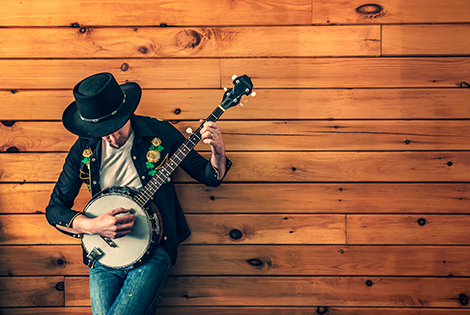Blog
Heartaches and Misery: Blues Music as a Window into Men's Sorrow
Posted by Amy Rosechandler

We live in a culture that marginalizes men's sadness. Working with men in counseling, I find my clients often have no place to go to feel safe expressing their emotions.
By the time some men reach my office, they've been holding onto sorrow for years, running from it and drowning it out with alcohol, drugs or anger. A recent New York Times article mentioned methods for Teaching Men to Be Emotionally Honest and reinforced how men have few socially acceptable ways and outlets to express emotion, leading to increased and disproportionately high rates of suicide, drug problems and violence; as well as over-dependence on romantic relationships to feel safe and understood.
Reflecting on traditional masculinity and the limitations on men’s emotional expression, I happened to hear a blues song on the radio. While men’s suffering is often silenced, in Blues music, you can hear it loud and clear. I was reminded how music connects us to people, history and to our own emotional experiences. In my house, we grew up listening to Muddy Waters, Howlin' Wolf, Eric Clapton and Sonny Terry. Now that I’m old enough to comprehend the lyrics, and I can see why my dad listens to the blues. He's a sensitive guy who seemed to get hit by life's meanest problems (poverty, disability, drugs, you name it). Blues music is about the perpetually unlucky, drifting and lost. To empathize with my father, I once devised an elaborate fantasy about becoming a famous blues singer. That was until I realized that except for a few wonderful, fabulous women (from Nina Simone to Diana Krall) most blues stories are about men and men's troubles. Listening to the lyrics of some of the best and saddest blues songs, you'll discover tales of heartbreak, loneliness, and loss. You can find similar themes in Hip-Hop and Country music, but Blues is the original music of misery, dating back to the 1800's, its roots are African American spiritual music, work and slavery songs.
Looking back at the history of this music, it’s easy to see how music makes it permissible and safe for men to express sorrow. In therapy sessions, younger male clients often reference their writing and favorite songs. I would encourage any counselor or client to pick up on these cues into deeper feelings and experiences to be explored in a meaningful way. Men may feel more comfortable initially sharing painful emotions through writing, song lyrics or journals. Therapists and clients can read together, write together and listen together to find shared understanding.
The themes we hear in Blues music are often what bring men into counseling: loss, anger, problems with substance abuse. When I hear clients mention music, here are some ways I use it as a springboard to explore deeper feelings:
- - I encourage my clients to bring their journals, lyrics and poetry into sessions.
- - I show active interest in client’s favorite songs, pull up the lyrics and we read the most poignant together.
- - My therapy groups use music by having group members bring in a song of that reflects their experience with themes discussed in group. Allow for members to hear songs together, share responses and personal connections to the music.
- - I may assign songs as ‘homework’ to hear and lyrics explore.
- - I may also consider a referral to a Music Therapist to enable clients to more specifically focus on music as a part of healing. A Music Therapist can be part of a clinical team.
See other blog posts